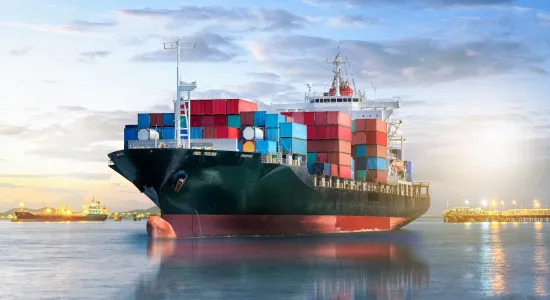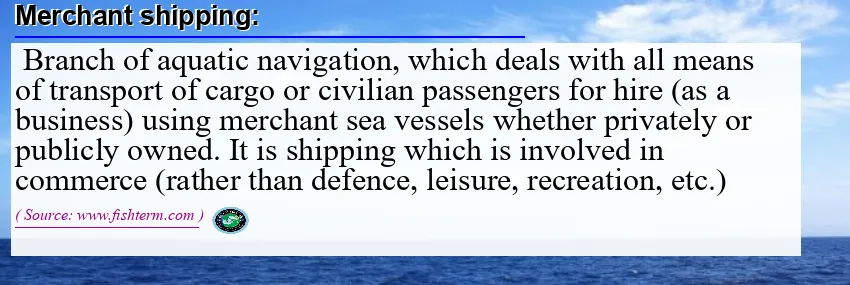Merchant shipping | merchant marine | merchant navy | mercantile marine | commercial shipping | commercial navy

📘 TABLE OF CONTENTS
⌚ Reading time:
📆 Last modified:
2024-02-13 00:00:00
1. Synonyms, etymology, translation, definition, examples and notes
1.1. Subject field:
- Fishery product marketing. (🏛 Hierarchy:
Fisheries >
Fishery product marketing )
- River navigation. (🏛 Hierarchy:
Fisheries >
Aquatic navigation >
River navigation )
- Marine navigation. (🏛 Hierarchy:
Fisheries >
Aquatic navigation >
Marine navigation )
1.2. IPA transcription and prononciation for merchant shipping, merchant marine, merchant navy, mercantile marine, commercial shipping and commercial navy: 🔊
- merchant marine: /ˈmɜːʧənt məˈriːn/;
- merchant shipping: /ˈmɜːʧənt ˈʃɪpɪŋ/;
- merchant navy: /ˈmɜːʧənt ˈneɪvɪ/ ;
- mercantile marine: /ˈmɜːkəntaɪl məˈriːn/;
- commercial shipping: /kəˈmɜːʃəl ˈʃɪpɪŋ/;
- Shipping: /ˈʃɪpɪŋ/
1.3. Synonyms of merchant shipping:
5 international synonym(s) for merchant shipping. Notably:
- Merchant marine ⏸•ılıılıılıılıılıılı. 0
- Merchant navy ⏸•ılıılıılıılıılıılı. 0
- Mercantile marine ⏸•ılıılıılıılıılıılı. 0
- Commercial shipping ⏸•ılıılıılıılıılıılı. 0
- Commercial navy ⏸•ılıılıılıılıılıılı. 0
1.4. Etymology of Merchant shipping:
Merchant shipping, merchant marine, merchant navy, mercantile marine, commercial shipping are all synonyms for the same concept, which originated at different times in the past.
The earliest term for this concept is mercantile marine, which originated in the 18th century and became the first widely recognised term in the 1840’s. With time, several other synonyms arose to shade this term - though it is still used to date.
The most popular of them all, merchant marine, probably emerged in the 19th century precisely before the 1860’s and grew popular gradually till it flew high in the 1920s and 1940s probably due to advancement in the maritime transport during that era (see the graph above). Some ancient publication employing the word merchant marine are
'A New and Complete System of Modern Geography ... With a Brief Sketch of the Origin, History, and Antiquities of Each Nation ... Illustrated, Etc' (page 501) By Eneas Mackenzie (Bookseller, of Newcastle-upon-Tyne.) published in 1817;
'Maritime Geography and Statistics', published in 1815, in London by James Hingston Tuckey, an Irish-born British explorer and a captain in the Royal Navy.
Commercial navy, a now archaic and obsolete term, originated in the 18th century. One popular early book that used the term commercial navy is 'The Naval Chronicle, Containing a General and Biographical History of the Royal Navy of the United Kingdom, with a Variety of Original Papers on Nautical Subjects', Volume 9, published by Joyce Gold on 30th June 1803 in London.
Merchant shipping is the second most used word nowadays for this concept, after merchant marine. It originated long before the 17th century with an early publication, 'Consuetudo, Vel Lex Mercatoria, Or The Antient Law-Merchant Divided Into Three Parts: According Tot the Essentiall Parts of Traffique ...' (mechant shipping was used on page 194) published by Gerard de Malynes in 1629
1.5. 🇫🇷 French translation of merchant shipping:
1.6. Definition of merchant shipping in fisheries:

1.7. Plural of merchant shipping:
Merchant shipping; merchant marine; merchant navies; mercantile marines; commercial shipping; commercial navies.;
1.8. Usage example of merchant shipping:
Ordinance No. 62-0F-30 of March 31, 1962 on the Code of Merchant Marine Fishing in Cameroun, article 2, paragraph 5 : " The merchant navy services in Douala centralise all registration, fitting-out and listing operations. "
2. Notes on merchant shipping
Fishery terminology records for Merchant shipping
LEAVE A COMMENT



 Linkedin
Linkedin share
share tweet
tweet

